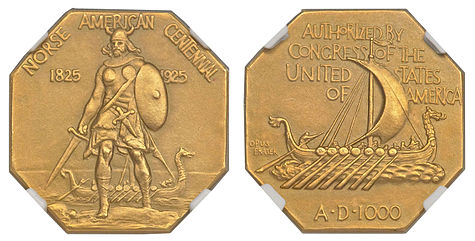United States | |
| Diameter |
|
|---|---|
| Thickness |
|
| Edge | plain |
| Composition |
|
| Years of minting | 1925 |
| Mintage |
|
| Mint marks | None, all pieces struck at Philadelphia Mint without mint mark. |
| Obverse | |
| Design | Viking warrior |
| Designer | James Earle Fraser |
| Design date | 1925 |
| Reverse | |
| Design | Viking longship |
| Designer | James Earle Fraser |
| Design date | 1925 |
The Norse-American medal was struck at the Philadelphia Mint in 1925, pursuant to an act of the United States Congress. It was issued for the 100th anniversary of the voyage of the ship Restauration, bringing early Norwegian immigrants to the United States.
U.S. Representative from Minnesota Ole Juulson Kvale, a Norwegian American, wanted a commemorative for the centennial celebrations of the Restauration journey. Rebuffed by the Treasury Department when he sought the issuance of a special coin, he instead settled for a medal. Sculpted by Buffalo nickel designer James Earle Fraser, the medals recognize those immigrants' Viking heritage, depicting a warrior of that culture on the obverse and his vessel on the reverse. The medals also recall the early Viking explorations of North America.
Once authorized by Congress, they were produced in various metals and sizes, for the most part prior to the celebrations near Minneapolis in June 1925. Only 53 were issued in gold, and they are rare and valuable today; those struck in silver or bronze have appreciated much less in value. They are sometimes collected as part of the U.S. commemorative coin series.
